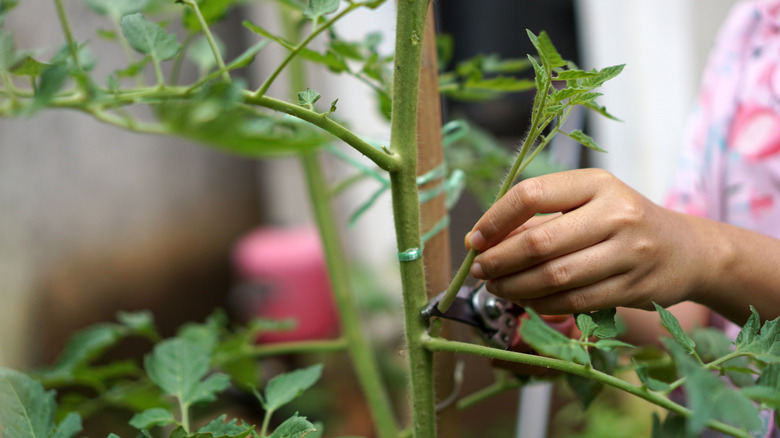This Pool Noodle Hack Could Produce Endless Tomato Plants In Your Garden
Tomato plants are one of the most common crops in backyards across America and one of the easiest plants to grow for beginner gardeners. But that doesn't mean they don't require some special attention, especially when they start sprouting sucker shoots which compete for nutrients with the main stem. Promptly pruning tomato suckers is necessary to help the plant produce more fruit, especially at the beginning of the growing season. This is also important to do because it thins out the branches for better airflow and prevents the plant from touching the ground.
Once you've trimmed your plant, however, you don't have to throw all those lovely sucker leaves away. You can turn them into brand-new tomato plants to multiply your garden and bring even more fresh tomatoes back to your table! In a TikTok video, backyard gardener Adelaide (@_thatgardenchick_) shows how she cut a pool noodle into sections and used them to float tomato suckers so they could sprout their own roots. By hacking a cheap pool noodle into little mini-floats for your suckers, you can make a hydroponic rooting station that helps each sucker sprout into its own plant within a few days to a week. Here's how to follow the ingenious hack, tips for sprouting and replanting your suckers, and some potential drawbacks to be aware of.
Float suckers in water to encourage root growth
To follow this gardening hack, start by cutting a pool noodle into cross-sections about 1 to 2 inches thick. Cut two slits in the side of each resulting "donut" shape, but be careful not to cut all the way through to the center hole. Slide one sucker into each of the slits you've just created and adjust until the stem pokes out from the bottom of the donut. You can also span a paper clip across the donut and float the plants through the center hole. Finally, float them directly on top of water in a large container. If you're having trouble balancing the plants as they grow, you could attach several noodle pieces together to create one hydroponic mega-float. When the roots are 1 inch long, it's time to transplant your hydroponic plants into your summer garden.
One potential drawback to this hack is that cheap pool noodles tend to disintegrate in water over time, leading some to wonder about chemicals leaching into the water and affecting their tomato plants. Most pool noodles are made from low-density polyethylene (PE foam) which is completely safe for use in gardens but may leach when kept in high-moisture conditions for a long time. Even so, most gardeners conclude that pool noodles are harmless for short-term hydroponic use. Over time, it will probably become necessary to throw out your old, disintegrating noodle pieces and repeat the hack with a new pool noodle.
